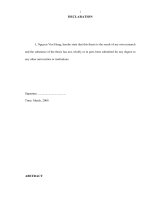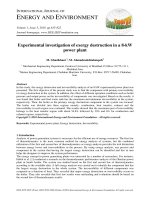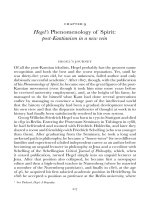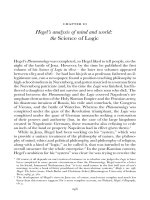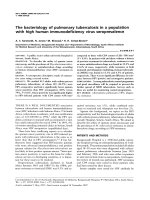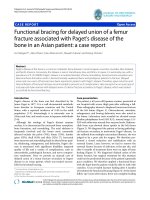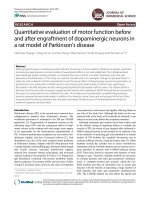Hegel’s Phenomenology of Spirit - post-Kantianism in a newv ein
Bạn đang xem bản rút gọn của tài liệu. Xem và tải ngay bản đầy đủ của tài liệu tại đây (242.99 KB, 29 trang )
Hegel’s Phenomenology of Spirit:
post-Kantianism in a newvein
’
Of all the post-Kantian idealists, Hegel probably has the greatest name
recognition and both the best and the worst reputation. Yet, until he
was thirty-five years old, he was an unknown, failed author and only
dubiously successful academic.
After , though, with the publication
of his Phenomenology of Spirit, he became one of the great figures of the post-
Kantian movement (even though it took him nine more years before
he received university employment), and, at the height of his fame, he
managed to do for himself what Kant had done several generations
earlier by managing to convince a large part of the intellectual world
that the history of philosophy had been a gradual development toward
his own view and that the disparate tendencies of thought at work in its
history had finally been satisfactorily resolved in his own system.
Georg WilhelmFriedrich Hegel was born in in Stuttgart and died
in in Berlin. Entering the Protestant Seminary in T¨ubingen in ,
he had befriended and roomed with Friedrich H¨olderlin, and later they
shared a roomand friendship with Friedrich Schelling (who was younger
than them). After graduating from the Seminary, he took a long and
awkward path to philosophy; he became a “house-tutor” for two different
families and experienced a failed independent career as an author before
becoming an unpaid lecturer in philosophy at Jena and a co-editor with
Schelling of the Schellingian Critical Journal of Philosophy, which, when
it ceased publication, turned Hegel simply into an unpaid lecturer at
Jena. After that position also collapsed, he became first a newspaper
editor and then a high-school teacher in Nuremberg (where he married
a member of the Nuremberg patriciate), and finally in , at the age
of , he acquired his first salaried academic position in Heidelberg. In
he accepted a position as professor at the Berlin university, where
See Pinkard, Hegel: A Biography.
Part III The revolution completed? Hegel
he quickly rose to fame as the European phenomenon known simply as
“Hegel.”
Like so many of his generation, Hegel became caught up in the post-
Kantian movement relatively early in life. In one of his letters to Schelling,
written shortly after his graduation fromthe Seminary in ,here-
marked that “from the Kantian philosophy and its highest completion
I expect a revolution in Germany. It will proceed from principles that
are present and that only need to be elaborated generally and applied
to all hitherto existing knowledge.”
From his time at the Seminary until
the end of his life, Hegel occupied himself with the issues surrounding
what it might mean to come to terms with the demands of the modern
world. While in T¨ubingen, he was inspired by the French Revolution
(as were H¨olderlin and Schelling), and he remained a lifelong advocate
of its importance for modern European, even global, life. Like many
of his generation, he, too, saw Kant as the philosophical counterpart,
even the voice, of the revolutionary events going on around himand
thought that “completing” Kant was part and parcel of the activity of
institutionalizing the gains of the Revolution.
Hegel served as a house-tutor in Frankfurt between and ,a
position his old friend, H¨olderlin, had found for him, and while there he
came under the influence of H¨olderlin’s own revolutionary attempts at
developing post-Kantian thought. For Hegel, H¨olderlin had shown how
Fichte’s development of post-Kantian thought failed to understand the
way in which there had to be a deeper unity between subject and object,
how the distinction between the subjective and the objective could not
itself be a subjective or an objective distinction, and that our awareness
of the distinction itself presupposes some background awareness of their
deeper unity. Underlying the rupture between our experience of the
world and the world itself, however, was a deeper sense of a notion of
truth – of “being,” as H¨olderlin called it – that was always presupposed
in all our otherwise fallible encounters with each other and the world.
Hegel took those views with himwhen he left Frankfurt for Jena in .A
small inheritance from his father (after his father’s death in ), and the
awareness that he was now thirty years old and still without a career led
Hegel to move to Jena and to attempt to become a university philosopher.
Although technically Hegel first published a book in – an anony-
mously published translation of and commentary on a French language
G. W. F. Hegel, Briefe von und an Hegel, vol. ,no.; Hegel: The Letters (trans. Clark Butler and
Christiane Seiler) (Bloomington: University of Indiana Press, ), p. .
Hegel’s Phenomenology of Spirit
radical critique of the German-speaking Bernese patriciate (done while
serving as a house-tutor for one of the leading families of the same patri-
ciate) – his first philosophical book (and certainly the first that carried his
name on it as the author) was his essay, The Difference between Fichte’s
and Schelling’s Systems of Philosophy. In it, he offered an argument that
Schelling’s philosophy (which until that point had been generally taken
by the German philosophical public as only a variant of Fichte’s thought)
actually constituted an advance on Fichte’s philosophy. Schelling had ar-
gued that Fichte’s key claim– that the difference between the subjective
and the objective points of view had to be itself a subjective distinc-
tion, something that the “I” posits – was itself flawed, since the line
between the “I” and the “Not-I” was not itself absolute; one can draw
it one way or another, idealistically or dogmatically, depending on what
one’s character inclined one to do. Instead, there had to be an overar-
ching point of view that was presupposed by both points of view, which
Schelling called the “absolute” and which, as encompassing both the sub-
jective and objective points of view, was itself only apprehendable by an
“intellectual intuition.” In his Difference book, Hegel endorsed that line of
thought, giving it some added heft by arguing that, in doing so, Schelling
had implicitly brought to light what was really the upshot of Kant’s three
Critiques, namely, that the sharp distinction that Kant seemed to be mak-
ing between concept and intuition was itself only an abstraction from
a more basic, unitary experience of ourselves as already being in the
world.
On Hegel’s recounting in the Difference book, Fichte, having in ef-
fect dropped Kant’s requirement of intuition altogether, was then forced
into understanding the “Not-I” as only a “posit” that the “I” had to con-
struct for itself, and by virtue of that move was driven to the one-sided
conclusion that the difference between the subjective and the objective
had to be itself a subjectively established difference. Hegel hinted that
Schelling’s conception of the “absolute” already indicated that Fichte’s
views concerning both the sharp differentiation between concept and
intuition and the subsequent downplaying of the role of intuitions were
themselves unnecessary, and, on the first page of the essay, Hegel noted
that “[i]n the principle of the deduction of the categories Kant’s philos-
ophy is authentic idealism” – that is, that the part of the Critique where
Kant wishes to show that there can be no awareness of unsynthesized
intuitions was implicitly the part where Kant himself showed that the
distinction between concepts and intuitions is itself relative to an over-
all background understanding of what normative role various elements of
Part III The revolution completed? Hegel
our cognitive practices must and do play.
Classifying something as a
“concept” or an “intuition,” that is, is already putting it into the place
it plays in the practice of giving and asking for reasons, in what Hegel
(following Schelling’s usage) took to calling the “Idea,” which Hegel
eventually more or less identified as the “space of reasons” (although this
was not his term).
Moreover, in the Difference book, Hegel also signaled to the philosoph-
ical public that he did not take this to be merely an academic issue. That
such oppositions (such as those between nature and freedom, subject and
object, concepts and intuitions) have come on the agenda of philosophers
in only indicates, he argued, that something deeper was at stake:
“When the might of union vanishes from the life of people, and the
oppositions lose their living connection and reciprocity and gain inde-
pendence, the need of philosophy arises.”
Philosophy, that is, is called to
make good when crucial matters in the lives of agents in a particular his-
torical social configuration are broken; and philosophy is to make good
on these things by looking at what is required of us in such broken times
to “heal” ourselves again. Philosophy, that is, is a response to human
needs, and its success has to do with whether it satisfies those needs.
Although Hegel’s first published (philosophical) book appeared in
, he had already been at work for quite some time on unsuccess-
ful drafts of various other philosophical works. The guiding question
behind almost all of them was one that had been nagging at him since
he was a student at the Protestant Seminary in T¨ubingen: what would
a modern religion look like, and was it possible to have a modern religion
that would satisfy our needs in the way that classical religions seemed to
have satisfied the needs of the ancients? The need that modern religions
were called upon to satisfy was, of course, the need to be free in a Kantian
or post-Kantian sense, and the question that Hegel was implicitly asking
was: what would it take to be able to lead one’s own life, to have a life of
one’s own, to be, in the language that Kant had introduced, autonomous,
self-legislating? For the young Hegel, it was more than clear that the
G. W. F. Hegel, Differenz des Fichteschen und Schellingschen Systems der Philosophie, in G. W. F. Hegel,
Werke in zwanzig B¨anden (eds. Eva Moldenhauer and Karl Markus Michel) (Frankfurt amMain:
Suhrkamp, ), hereafter abbreviated as HeW and volume number, ,p.; The Difference Between
Fichte’s and Schelling’s Systems of Philosophy (trans. H. S. Harris and Walter Cerf ) (Albany: State
University of New York Press, ), p. .
The term, the “space of reasons” was introduced by Wilfrid Sellars to make a very similar
Kantian–Hegelian point. For the canonical use of it, see Wilfrid Sellars, “Empiricism and the
Philosophy of Mind,” in Wilfrid Sellars, Science, Perception and Reality (London: Routledge and
Kegan Paul, ), pp. – (see p. in particular).
Hegel, The Difference between Fichte’s and Schelling’s Systems of Philosophy,p.; HeW, ,p..
Hegel’s Phenomenology of Spirit
established Protestant Church of W¨urttemberg (his homeland) was not
in any way capable of satisfying that need, and the Catholic Church was
simply out of the question for Hegel the W¨urttemberg Protestant. But if
not those churches, then what? Another formof Christianity? Another
religion? No religion at all?
Those issues among others formed the core topics of Hegel’s work in
Jena, and his stay there turned out to be particularly eventful and particu-
larly traumatic. He was unable to land a salaried position; the Napoleonic
wars in Germany led to a rapid inflation in prices that diminished almost
daily the worth of what was left of his inheritance; and, after the scandal
of involving Schelling and his new wife, Caroline, Schelling traded
his position in Jena for a better one in W¨urzburg, abandoning Hegel to
his fate in the declining university at Jena. Hegel worked on one attempt
after another at developing his “system” of philosophy, finishing some,
cutting off some others in the process, but eventually putting all of them
in the drawer as simply not good enough. As he was finally running out
of money and all hope for any future employment as an academic, he set
to work on his greatest piece, the epochal Phenomenology of Spirit, finished
in and published around Easter, . He completed work on it
as Napoleon led his troops into the decisive battle of Jena, where the
French routed the Prussian army and threatened the town of Jena itself.
(While writing the Phenomenology, Hegel also managed to engender an
illegitimate son from his landlady, and, despite the success of the book,
Hegel was nonetheless unsuccessful at landing a university position for
himself for several more years.)
PHENOMENOLOGY
OF SPIRIT
One of Hegel’s students in Berlin, Karl Michelet, claimed that Hegel
took to describing his Phenomenology of Spirit as his own “voyage of
discovery.”
The clich´e in this case was fitting, since working on that
book brought himto the views that he more or less carried with himfor
the rest of his life. Even so, the book’s place in the whole Hegelian system
has always been controversial. Although Hegel originally described the
Phenomenology as the “Introduction” to his forthcoming “system,” there
was confusion about exactly what Hegel intended by that. (His printer
G¨unther Nicolin (ed.), Hegel in Berichten seiner Zeitgenossen (Hamburg: Felix Meiner, ), no. ,
p. . Famously, the very translation of the term, Geist, in Hegel is contested; the first translator,
J. B. Baillie, translated Hegel’s book as Phenomenology of Mind, whereas A. V. Miller later translated
it as Phenomenology of Spirit.
Part III The revolution completed? Hegel
became so confused with Hegel’s periodic changes of mind that he ac-
tually ended up printing different titles to the book in the first run.) He
never lectured on the Jena Phenomenology while in Berlin, although he did
lecture on some sections of it that he had reworked into his Encyclopedia
of the Philosophical Sciences, and near the end of his life he even disavowed
it as the proper “introduction” to his systemof philosophy at all, claim-
ing that his later Encyclopedia now formed the proper introduction. (The
Encyclopedia was first published in and went through published revi-
sions and expansions in and .) However, he continued to give
copies of the Phenomenology to friends and notable visitors, and in
he signed a contract to publish a revised edition of it. (He died before
he could do much work on it, and although the revisions were clearly
intended only to be minor, we will, of course, never know what Hegel
might have done once he began work on it.)
Early readers also had trouble figuring out just what the book was
about. Even a quick glance at its contents
seemed to indicate that Hegel
intended the book to be about philosophy and European history, but it
was also about religion (and was possibly even a book of theology), it had
many tantalizingly titled chapters whose historical references were not
immediately apparent, and it ended with a short chapter portentously
titled, “Absolute Knowing.” Not surprisingly, interpreters have always
had trouble making sense of the book; it has been held, variously, to be
a “coming of age” novel (a Bildungsroman), a new version of the divine
comedy, a tragedy, a tragi-comedy, a work in epistemology, a philosophy
of history, a treatise in Christian theology, and an announcement of the
death of God.
Hegel intended the book to satisfy the needs of contemporary (Euro-
pean) humanity: it was to provide an education, a Bildung, a formation
for its readership so that they could come to grasp who they had become
(namely, a people individually and collectively “called” to be free), why
they had become those people, and why that had been necessary.Inthatre-
spect, the Phenomenology was a completely post-Kantian work: it intended
to show its readership why “leading one’s own life,” self-determination,
had become necessary for “us moderns” and what such “self-legislation”
actually meant.
It was thus not surprising that the book began with a devastating, even
if very ironical, critique of Jacobi’s position against Kantianism(and all
Hegel’s Phenomenology of Spirit
forms of post-Kantianism), namely, that we were in possession of a kind
of “sense-certainty” about individual objects in the world that could not
be undermined by anything else and which showed that there was an
element of “certainty” about our experience of the world (and thus also
of God) that philosophy was powerless to undermine. Hegel called this
a thesis about “consciousness.” If we begin with our consciousness of
singular objects present to our senses (“sense-certainty,” an awareness
of “things” that is supposedly prior to fully fledged judgments), and
hold that what makes those awarenesses true are in fact the singular
objects themselves, then we take those objects to be the “truth-makers”
of our judgments about them; however, in taking these objects to be
the “truth-makers” of our awareness of them, we find that our grasp
on themdissolves (or, alternatively: that in their role as “truth-makers”
they themselves dissolve). The impetus for such dissolution lies in the
way our taking themto play the role of “truth-makers” in that way
turns out to involve ineliminable tensions or contradictions in our very
“takings” themselves, and the result, so Hegel argued, is that, in the
process of working out those tensions, we discover that it could not be the
singular objects of sense-certainty that had been playing the normative
role of “making” those judgments of sense-certainty true, but the objects
of more developed, more mediated perceptual experience had to have
been playing that role. (The objects of “sense-certainty” turned out,
that is, not to be playing the normative role that the proponents of
“sense-certainty” had originally taken themto be playing; something else,
namely, perceptual objects as complexes of individual things instantiating
general properties, turned out to be playing that role.) Or, to put it
more dialectically, the tensions and contradictions involved in taking
singular objects to be making our judgments about them true require us
to acknowledge that something else must be playing that role (and that,
implicitly, we are already relying on that “something else” in making such
judgments in the first place).
The dialectic inherent in Jacobi’s “sense-certainty” thus turns on our
being required to see the “truth-maker” of even simple judgments about
the existence of singular things of experience as consisting of more com-
plex unities of individual-things-possessing-general-properties of which
we are “perceptually,” and not simply “directly” aware. That is, we can
legitimate judgments about singular objects only by referring them to
our awareness of themas singular objects possessing general properties,
which, in turn, requires us to legitimate them in terms of our take on the
world in which they appear as such perceptual objects. (That is, a focus
Part III The revolution completed? Hegel
on how we can legitimate perceptual judgments requires a recognition
of a certain type of holism at work in our practices of legitimation.
) That
world is itself structured by laws and forces that themselves cannot be ob-
jects of direct perceptual awareness but must instead be apprehended –
so we seemto be required to say – more intellectually by the faculty
of “understanding.” The dialectic of “consciousness” comes to an end
when, so Hegel argues, we find that this world which we apprehend by
“the understanding” itself in turn generates a set of contradictory, anti-
nomial results that it cannot on its own terms accept – even the notion
of the world itself fails to be that which plays the normative role (without
anything else accompanying it) of making our judgments about items in
it true. What that requires us to see, so Hegel argues, is that the concep-
tion that there is any object or set of objects (even conceived as the world
itself ) that on its own, independently of our own activities, makes our
judgments about those things true – as it were, something on which we
could rely to keep us on the right track independently of any of our own
ways of taking it, of our “keeping ourselves” on the right track – is itself
so deeply ridden with tensions and contradictions in its own terms that
it is untenable. The whole outlook of seeking the “objects” of some kind
of direct awareness that would make that awareness true independently
of our “taking” it to be such-and-such is so riddled with tensions that it
requires us to acknowledge that part of that awareness has to do with the
ways we “take” those objects. We must acknowledge, as Kant put it, that
it must be possible for an “I think” to accompany all our consciousness of
things. The dialectic of “consciousness” therefore requires us to focus on
how we hold ourselves to norms, and how we cannot rely on something
independently of our own activities to keep us on the straight and narrow
path to truth.
-
The opening chapters of the Phenomenology provided Hegel with a way of
stating some Kantian points without, so he thought, having to commit
himself to (what he regarded as) either the unfortunate and untenable
Kantian dualismbetween concepts and intuitions or to the Kantian
mechanism of the “imposition” of concepts on sensibility to which Kant
had been driven by virtue of accepting that dualism(that is, to seeing
On this theme of holism in “sense-certainty” and “perception,” see Robert Brandom, “Holism
and Idealismin Hegel’s Phenomenology,” in Robert Brandom, Tales of the Mighty Dead: Historical
Essays in the Metaphysics of Intentionality, forthcoming.
Hegel’s Phenomenology of Spirit
intuition as providing neutral content on which an organizational, con-
ceptual scheme was then imposed).
In showing that the normative demands made by “consciousness”
(that is, the norms governing judgments about objects of which we are
aware), we are driven to comprehend that our mode of taking themto be
such-and-such plays just as important a role in the cognitive enterprise as
do the objects themselves or our so-called direct awareness of them. That
itself therefore raises the question: what are the conditions under which
our “takings” of them might be successful? In particular, how might we
distinguish what only seems to be “the way we must take them” from
the “way they really are?”
In the next section of the Phenomenology, titled “Self-Consciousness,”
Hegel carried out his most radical reformulation of Kantian philoso-
phy, drawing deeply on Fichte’s, H¨olderlin’s, and Schelling’s influences,
while giving thema thoroughly new twist. Kant had said that, in mak-
ing judgments, we follow the “rule” spontaneously prescribed for us by
the concepts produced by our own intellects (the “understanding”), and
had argued that the necessary, pure “rules” or “concepts of the under-
standing” were generated by the requirements of ascribing experiences to
(in Kant’s own terms) a “universal self-consciousness” – that is, what were
the requirements for any agent’s “I think” to be able to accompany all his
representations. Hegel’s way of putting that Kantian question had to do
with what in general could ever possess the authority to determine what
counted as the rules of such a shared, “universal self-consciousness.”
The outcome of the dialectic of “consciousness” had shown that it
depended on how we were taking things, and that, in turn, raised the
issue of what we might be seeking to accomplish in taking things one
way as opposed to another. Thus, the issue turned on what purposes
might be normatively in play (or what basic needs might have to be
satisfied) in taking things one way as opposed to another.
At first, it might look as if “life” itself set those purposes, and the neces-
sary rules for judgment would be those called for by the needs of organic
sustenance and reproduction. However, practical desires are themselves
like sensations in cognition; they acquire a normative significance only
to the extent that we confer such a significance on them(or, in Kant’s
language, only as we incorporate them into our maxims). That means
that agents are never simply satisfying desires; they are satisfying a project
that they have (at least implicitly) set for themselves in terms of which
desires have a significance that may not correspond to their intensity.
The agent, that is, has a “negative” relation to those desires, and thus
Part III The revolution completed? Hegel
the agent never simply “is” what he naturally is but “is what he is” only
in terms of this potentially negative self-relation to himself – his (perhaps
implicit) project for his life, not “life” itself, determining the norms by
which he ranks his desires.
If not the purposes of life, what else then secures the normative bind-
ingness of any of those projects or basic maxims? It cannot be simply
“reason” itself, since that would beg the question of what purposes the
use of reason best serves (or whether those purposes are to take prece-
dence over any others in any non-question-begging way, or what even
counts as a reason to whom).
In putting the question in that way, Hegel raised the issue that Kant
had himself brought out so prominently in his own practical philosophy,
which we have called the “Kantian paradox.” Kant had argued that we
must practically take ourselves to be self-determining, that what we as
agents were “ultimately about” was freedom in this radical sense (or, to
put it in slightly non-Kantian terms, there would be no point to our lives
if they did not somehow embody this kind of freedom). But if the will
imposes such a “law” on itself, then it must do so for a reason (or else be
lawless); a lawless will, however, cannot be regarded as a free will; hence,
the will must impose this law on itself for a reason that then cannot itself
be self-imposed (since it is required to impose any other reasons). The
“paradox” is that we seemto be both required not to have an antecedent
reason for the legislation of any basic maxim and to have such a reason.
Kant’s own way out was simply to invoke the “fact of reason,” which
from the standpoint of the post-Kantians amounted more to stating the
“paradox” than actually dealing with it.
Like many others, Hegel, too, was unsatisfied with that result. How-
ever, unlike Schelling, Hegel did not think that any kind of metaphysics
of Naturphilosophie would satisfactorily resolve the issue, since such a
Naturphilosophie either ultimately rested on some form of “intellectual
intuition” (which, as Hegel was later to remark in his lectures on the
history of philosophy, basically would have the same value as consult-
ing an oracle); or, in light of Kant’s destruction of pre-critical meta-
physics, it simply begged all the questions it was trying to answer. Instead,
something basic about our conception of the nature of agency itself
had to be invoked. It is probably not going too far to say that Hegel
viewed the “Kantian paradox” as the basic problemthat all post-Kantian
On this notion of the agent’s “negative self-relation,” see the clear and insightful discussion
by Robert Pippin, “Naturalness and Mindedness: Hegel’s Compatibilism,” Journal of European
Philosophy, () (August ), –.
Hegel’s Phenomenology of Spirit
philosophies had to solve; and the solution had to be to face up to the
paradox and to see how we might make it less lethal to our conception
of agency while still holding onto it, all in terms of integrating it into
some overall conception of agency that showed how the paradox was
in fact livable and conceivable. (Following Schiller’s precedent, Hegel
used the German term, “aufheben,” with its triple meanings of “cancel,”
“preserve,” and “raise” to express this goal.)
What the “Kantian paradox” seemed to call for was for an agent to
split himself in two – in effect, for “me” to issue a law to myself that
“I” could then use as a reason to apply the law to myself (what Hegel in
his post-Phenomenology writings liked to call becoming the “other of itself,”
“das Andere seiner selbst,” a phrase he claimed to take from Plato).
Splitting
the agent in two – seeing each as the “negative” of the other, in Hegel’s
terms – does nothing to solve the problem, since such a view cannot
adjudicate which of the two sides of the same agent is to have priority over
the other; it cannot, that is, show how splitting myself in two somehow
“binds” one of my parts because of legislation enacted by the other, nor
can it even show how it would be possible for me correctly to grasp the
rule to which I amsupposedly subjecting myself.
Hegel’s resolution of the Kantian paradox was to see it in social terms.
Since the agent cannot secure any bindingness for the principle simply
on his own, he requires the recognition of another agent of it as binding on
both of them. Each demands recognition from the other that the “law”
he enacts is authoritative (that is, right). In Hegel’s terms, the other agent
must become the “negative” of the first agent, and vice versa; Hegel
in fact speaks of this rather colorfully as a “doubling” (Verdopplung)of
self-consciousness.
Or, to put it another way, the first agent demands
that the other agent recognize his entitlement to the commitment he
has undertaken and vice versa. This set of demands leads to a struggle
for recognition, since at the beginning of the struggle, each agent is in
effect lawless, simply imposing a set of demands for reasons that, from
the standpoint of the other agent, must seem to be without warrant.
Each agent just chooses his own maxims (perhaps as those that satisfy his
The phrase occurs in several places. See G. W. F. Hegel, Science of Logic (trans. A. V. Miller)
(Oxford University Press, ), p. ; Wissenschaft der Logik (Hamburg: Felix Meiner, ),
vol. ,p.. In the Enzyklop¨adie, see particularly
§
, Zusatz. It also occurs in the Enzyklop¨adie,
§
, Zusatz;
§
, Zusatz;
§
, Zusatz;
§
, Zusatz.
The argument is strikingly similar to Wittgenstein’s arguments about rule-following and private
languages. See Terry Pinkard, “Analytics, Continentals, and Modern Skepticism,” The Monist,
() (April ), –.
G. W. F. Hegel, Phenomenology of Spirit, para. ; Ph¨anomenologie des Geistes,p..
